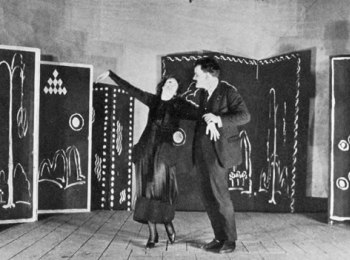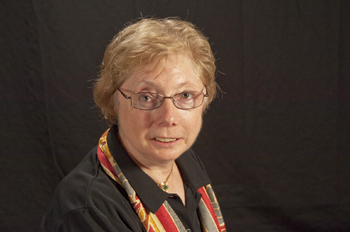The Women Who Changed Theater in America
 |
Norma Millay and Harrison Dowd rehearsing Edna St. Vincent Millay's Aria da Capo, 1919. |
One of them went on to win the Pulitzer Prize for poetry. The other garnered a Pulitzer for drama. Highly successful in their day, the two writers helped shape American theater in the early part of the 20th century.
Edna St. Vincent Millay and Susan Glaspell were members of "the most important of the Little Theaters that emerged just before America entered World War I," according to a new book by University at Albany Professor Emerita of English Judith E. Barlow, Women Writers of the Provincetown Players (2009 SUNY Press).
"What made the Provincetown Players different from anyone else was that they performed American plays," said Barlow. As a result, they had a tremendous impact on the development of modern theater. In seven years, they produced almost 100 plays by some 50 artists, a large number of which were written by women.
Thirteen of the 29 people listed in the group's incorporation papers were female. Barlow shines a light on a one-act play from each of the female Players.
The Players were mostly white, middle class, and had some college education. But they considered themselves radical bohemians and performed in an abandoned wharf down the street from Glaspell's house on Commercial Street in Provincetown, Mass. They included an anarchist friend of Emma Goldman who sold tickets, and they questioned accepted notions about birth control, marriage, spinsters and the double standard.
 |
Professor Emerita of English Judith E. Barlow showcases one play by each of the female members of the Provincetown Players in her new book. (Photo Mark Schmidt) |
It was a different time. "Political radicalism and artistic innovation went hand in hand: when silk workers in Paterson, New Jersey, called a strike in 1913, New York artists and intellectuals joined with them to stage a fund-raising pageant," wrote Barlow.
"I've been working on women playwrights for most of my career," said Barlow, a Collins Fellow who joined UAlbany as a lecturer in 1973, and became a full professor in 1995. She earned a Ph.D. in English from the University of Pennsylvania in 1975.
"When I started teaching, there were almost no plays available by women playwrights," said Barlow. "They were either buried in obscure anthologies or they were out of print."
The research meant many hours of hunting at the Library of Congress, which keeps a copy of every copyrighted play; and many more digging through boxes of plays at Yale's Beinecke Library and others.
![]() For more news, subscribe to UAlbany's RSS headline feeds
For more news, subscribe to UAlbany's RSS headline feeds


